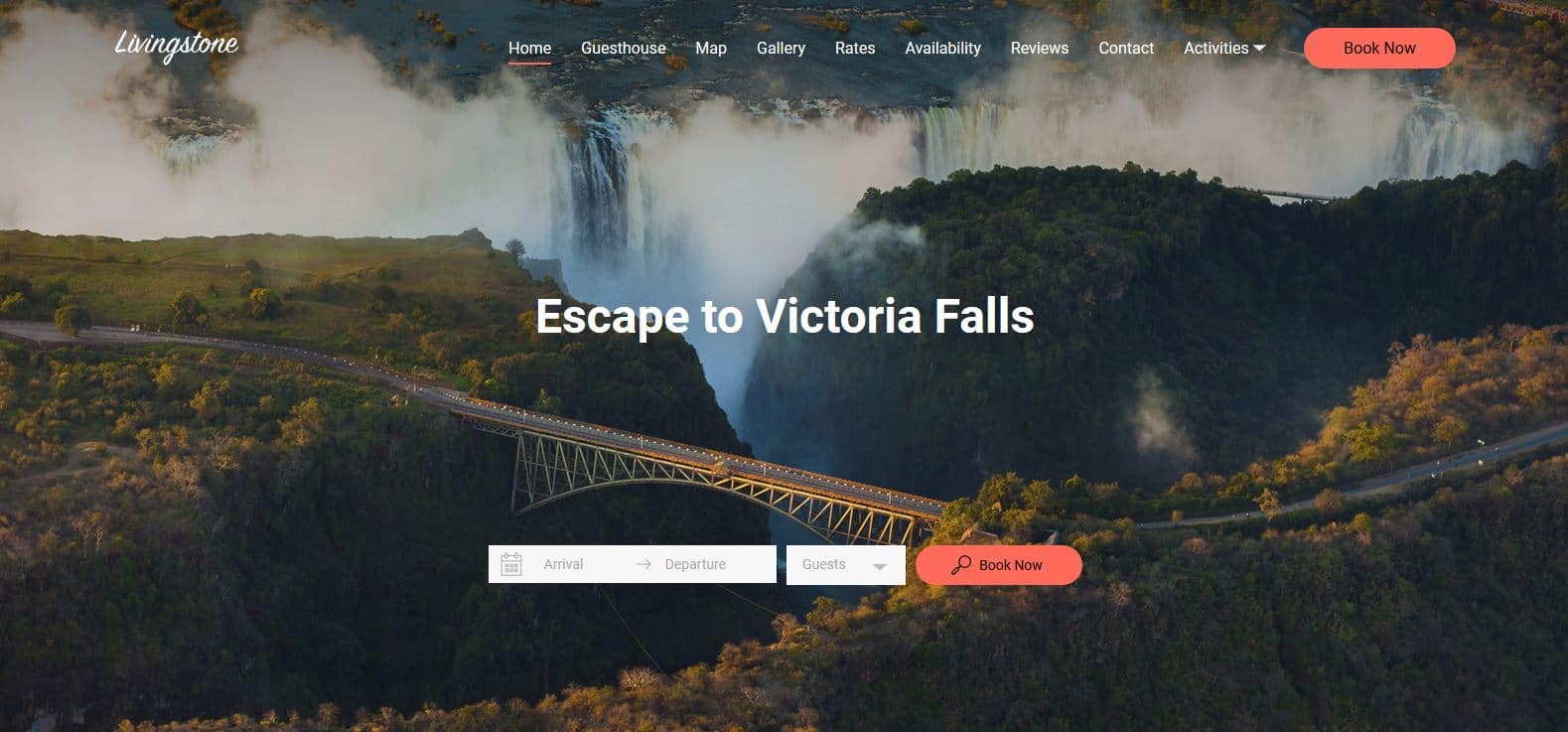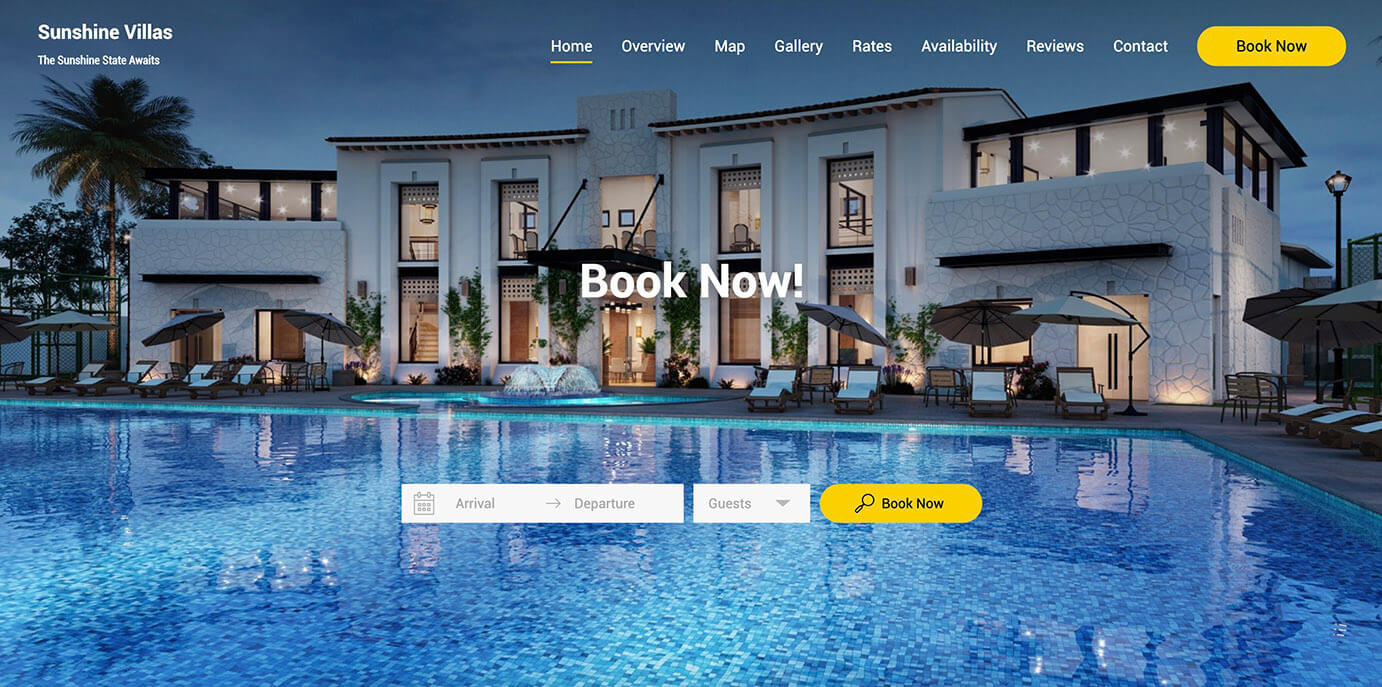A study research firm Clutch found that email, website, and social media are the top three marketing tools used by any small businesses. Around 54% of them use email, 51% have a website and 48% use social media for marketing purposes.
While it’s a positive start, almost half of small businesses are still yet to launch their own professional website – a big error if you want to be successful in a predominantly online industry like vacation rentals.
Due to the coronavirus pandemic, vacation rental owners and property managers that rely on OTAs like Airbnb, Vrbo, Booking.com, etc. have been impacted by their cancellations policies. According to a report on CNBC, short-term rental hosts are using their “quaran-time” to diversify their booking channels and start building their own vacation rental website.
It’s all good and well advertising your vacation rental property on listing sites to reach big audiences and generate more inquiries, but when you’re sick of paying fees or you have loyal, returning guests who want to book direct – what do you do?
In order to boost your bookings, become more self-sufficient and take control over your vacation rental business, you’re going to need your own website. And not just any website, either! You need a beautiful and optimized vacation rental website with all the features and functionality needed to take direct bookings, manage reservations and synchronize all your other channels for complete ease.
Think of a website as the first touchpoint for your potential guests to learn about what your property has to offer. Travelers are becoming increasingly more internet savvy and are window shopping around for the best deal, rather than relying solely on the big OTAs. Some even know about the #BookDirect movement which has cropped up in recent years! Not only will you be able to offer your guests the best deal, but you will also be able to generate a higher profit.

Additionally, by having your own direct booking channel, you will have more control over situations where guests request refunds, cause damage or complain about a property.
In short, if you want your short-term rental company to be successful, a professional short-term rental website is key. Let’s check out some of the main reasons why you should add building a vacation rental website to your list of things to do during this quaran-time.
1. Start Getting Direct Bookings
One of the most important reasons you’ll want to market your own vacation rental website is so that you can take bookings directly. That means no extra host or traveler fees – great news for you and your guests!
Research on hotel booking preferences has revealed that 65% of guests prefer to book directly with the provider rather than using OTAs like Booking.com, and that’s especially true for return visitors. So what’s to say these figures are any different for vacation rental bookings?
Once you’ve got your vacation rental website up and running, remember to work on your SEO. Google has to be able to analyze your website and deem its content relevant enough to present it to travelers who are on the lookout. For instance, if somebody searches for “holiday home in Florida” Google will scan your website content to determine if you offer exactly what the user is looking for.
So by taking control of your own SEO, you can implement the most relevant keywords throughout your website and start appearing in Google. However, keep in mind that SEO takes time but the more content you offer on your website, the more possibilities you’ll have to appear on Google, the more conversions you can get. Take a look at simple tips and techniques which can easily and quickly improve the SEO of your website.
A lot of specialized vacation rental website templates like Lodgify are fully optimized to SEO and include a booking system, but even if you choose to create your website with a more general provider, there are plenty of widgets out there that will allow you to add booking capability to your site.
2. Take Control of Your Marketing
A website remains the “most popular way for small businesses to market themselves online”. So it’s no surprise that in today’s Google-giddy society, online visibility is more important than ever and vacation rentals are no exception.
Think of your website as the backbone of your online vacation rental business. Every effort you carry out in terms of your marketing strategy will lead back to your site. That means every email you send, every blog article you publish and every social media post you share; all marketing actions like these will actively drive visitors to your website for more information.

While using listing sites such as Airbnb are highly effective for getting your property in front of vast quantities of travelers, it’s also essential you have your own online space that you’re totally in control of. This allows you to send inquiring guests to specific pages when they want to find out a bit more about your offerings, and it even facilitates direct communication between you and your potential renters.
3. Avoid Booking Fees
The number of reservations a vacation rental receives is a significant KPI for any owner to track. However, when advertising purely on third-party sites, costs can soon escalate when you take into account all the different fees and charges for using the site or accepting payments.
When you have your own vacation rental website, you can rest assured that you aren’t paying any additional fees every time you receive a booking. Besides accepting new bookings, having your own website is also crucial in order to cater to repeated guests who prefer to reserve their stay with you directly.
In addition, vacation rental website software like Lodgify allows you the possibility to synchronize any external channels and reservations you receive into one centralized calendar via a channel manager. This takes the hassle out of managing multiple listings and helps streamline the overall running of your business.
4. Create Online Credibility
Nowadays, every reputable business has its own website. If it doesn’t, doesn’t something seem wrong? This same mentality should apply to your lodging business.
Yes – other platforms with the specific purpose of helping you advertise your business do exist, but what if potential guests try looking for your home elsewhere on the internet and come up short? It might even dissuade them from booking with you in the first place.
It’s no secret that guests love to window shop on OTAs, then Google the property brands from their shortlist to check out their reputation and credibility. So, name-drop your brand on OTA portals, and you’ll find that users who love to cross-reference everything on the internet can make sure your listings are consistent and verifiable. Savvy guests wanting to avoid booking fees will also hunt around for a better deal on prices – that’s where your website comes into play.
Think of your website as your business card: if someone is interested in your property, what URL will you give them? Do you really want to send them to a third-party OTA listing? The short answer is no, and that’s why a website is an absolute essential for any serious vacation rental business owner looking to create online credibility.
5. Build Up Your Brand and Improve Brand Awareness
Ask anyone you know about which travel services they’re familiar with and you’ll discover two common ingredients – they all have websites and recognizable brands. Branding is often overlooked by smaller vacation rental operators, but it’s a huge factor that helps to differentiate one short-term rental from its competition.
Having your own website is the best starting point for building a solid brand presence online. You want people to know about your vacation rental? You’d better have a branded website.
Establishing your vacation rental brand, however, isn’t a matter of black and white – though colors are certainly involved in the process! It’s about creating consistency across your website and any external listings, always referring to your business by its brand name and, having a good logo to accompany all your marketing efforts both on and offline.

Building a vacation rental website not only gives you a concrete location to define your brand – including its logo, color scheme and company values – but it also helps to establish trust and a solid reputation with past, potential and future guests.
On online travel agencies, your brand is just a commodity – a needle in a haystack, one listing out of thousands. And in many cases, guests will see the OTA as the brand, rather than the host themselves.
According to research by BlueCorona, 30% of consumers wouldn’t even consider a business without a website. That’s because websites are a sign of credibility and can help to establish authority on a specific subject. In fact, for vacation rental businesses, websites are the perfect space to show off insider knowledge about a certain destination, activity or seasonal event that takes place. In providing travelers with useful content that helps them to make their decision, you create a relationship with the potential guest and this can encourage conversion into booking.
Your brand will help you stand out from your competitors, and your guests will begin to identify with your brand as something more than just another vacation rental business. This is even truer if you have your own stunning vacation rental website!
6. Personalize Your Business
Having your own website means you can personalize your business. You can include a whole section dedicated to “about us” in which you tell your story. For example, how exactly you got into the business and why you love it. Whether it’s a family-run business, with your partner or doing it solo, guests love reading about their potential hosts and want to find more about them.
Travelers want to see proof that you care about them, that you’re there to help them, that there is a real human behind the booking forms and confirmation emails. What’s more, they’ll feel more confident that you’re invested in them and in their guest experience.
You can also get creative and have a blog! There are so many topics you can write about, one of the most popular being the area of your rental. Tell your guests what they can do, see, eat and visit. You can also provide tips and tricks for travel in the local area, plus any extra information regarding your rental. Use your social media outlets to promote your post, which in turn, will bring more potential guests to your site.
7. Share Your Cleaning Protocols
The travel industry has started to take notice of the need to offer reassurances about cleaning, for example:
- Marriott International said it will adopt its own enhanced standards, including spraying hotel rooms with disinfectant after every guest stay.
- Airbnb will be releasing its Enhanced Cleaning Initiative for hosts with information of how to protect their vacation rentals of COVID-19.
- VRMA and VRHP have recently released a series of guidelines to help with COVID-19 prevention.
In order to recover the trust of potential guests, it’s important to let them know all the steps you’re taking to ensure your vacation rental properties are sanitized and disinfected. We recommend sharing this information at key guest communication such as on emails and especially, on your website.

You can include content that mentions enhanced cleaning like for example, “This property is professionally deep cleaned after every stay, and we’re taking extra care to disinfect high touch areas between stays and provide a selection of recommended cleaning products for guests’ use.” In addition, you can have a dedicated page with a list of all the steps you take to sanitize your properties alongside other important information such if cleaning supplies are provided in the property and where they can find them.
8. Become listing site independent
There are now more hosts than ever on Airbnb, and this number looks unlikely to decline any time soon.
History has shown that as OTAs become more powerful, they take more and more value away by charging higher commissions to travelers and owners alike. Having your own website is the first step in taking back this control that you are losing to OTAs and taking your business into your own hands, without your business being at the mercy of some large corporate travel agencies.
Having your own website adds another channel into your marketing mix where you can reach guests you couldn’t reach before. Your own website is a way to stand out from the crowd and run your hospitality business according to your own rules, not the rules of whichever OTAs you’re listing with.
9. Enjoy complete freedom
There is no denying that having your own vacation rental website allows you to be 100% in control of the content that is published on it.
Want more photos on the homepage? You can make it happen. Want your headline text a bit bigger so it stands out more? That’s on you, too!
No matter what you want to put on your site, there are no restrictions that will limit your decision making.
Listing sites and OTAs tend to censor hosts by imposing character limits and a maximum number of photos, which can leave users feeling frustrated. With your own site, however, you are the only person in charge of the rules.
That means you can add as many reviews, local tips, blog posts, details about add-on services like bike rental, and special promotions (etc.) as you like, without any limitations.
Get Started With Your Own Vacation Rental Website
Creating a vacation rental website doesn’t have to give owners a headache. Lodgify’s software allows you to create your own hospitality website and accept online bookings at the click of a button.
Lodgify’s vacation rental website templates are 100% customizable, so you can adapt each aspect of the design to fit your business’ brand. All Lodgify websites are also mobile-friendly, so the quality of your website won’t be compromised when users access your page from a handheld device or tablet.

What’s more, with the built-in channel manager, you’ll be able to synchronize your website with any external channels and manage all your reservations from a centralized system. Plus, you can easily integrate your Lodgify website with social networks like Facebook and Instagram!
Create your own stunning website with Lodgify to open a new world of possibilities for your vacation rental. We’re so certain you’ll like it, we’ll happily let you try our software for 7 days free of charge!
Any vacation rental business which doesn’t have a branded, bookable website in 2020 will soon fall behind their competition. Not only will you be seen as far less credible, but you’ll also miss out on the many benefits having a website brings – such as marketing opportunities, direct bookings and establishing a brand. If like many owners you’re still without an optimized website, make sure you address this as soon as possible in order to reap the rewards for this financial year.
Convinced you need a vacation rental website yet? It’s time for owners to take the reins and become masters of their fates – not just spectators wondering where the next booking is coming from.


